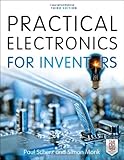http://www.amazon.com/Practical-Electronics-Inventors-Paul-S...
I'm in the crowd that's getting into analog electronics and digital circuits backwards, as it were, by starting with programmable microcontrollers (Arduinos etc.) and moving outward from them on the circuit board. I found the latter book was particularly well suited for self-learning. It is also huge and, as far as I can tell, vastly comprehensive. The writing is clear and concise. Explanations of concepts often draw on analogy, classical electrical theory, and quantum physics alike. This multitude of approaches has helped me grasp the fundamentals more firmly than other books. It also keeps an eye on practical applications. Sections on, say, power rectifiers or op amps or timers or debouncing circuits or whatever all show you many variations on a theme, with discussion of what you would want to use in which situations.
Also, if I'm speaking to anyone else like me, software engineers who want to know hardware, buy all the books you can, but get an oscilloscope. I waited far too long for this purchase. I wouldn't write code without a debugger; this is the hardware equivalent. I recently got this little Rigol model: https://www.adafruit.com/products/681 . It costs the same as a few big electronics books, and it's the difference between stumbling around a room in the dark and having illumination everywhere.
[1]: http://www.amazon.com/Practical-Electronics-Inventors-Paul-S...
In no particular order, I suggest:
Check out makezine.com.
Find a local makerspace[1]
Work through tutorials and references for beginners (great hands on electronics book [2], more in-depth info to augment an electronics tutorial [3], arduino [4])
[1] https://duckduckgo.com/?q=makerspace
[2] http://www.amazon.com/Make-Electronics-Learning-Through-Disc...
[3] http://www.amazon.com/Practical-Electronics-Inventors-Third-...
[4] http://www.amazon.com/Arduino-Workshop-Hands--Introduction-P...


https://www.amazon.com/Practical-Electronics-Inventors-Third...